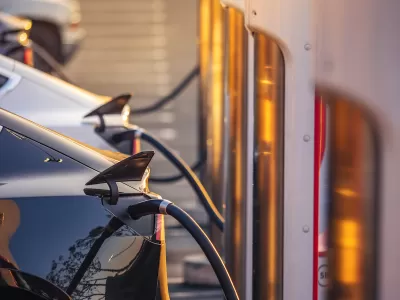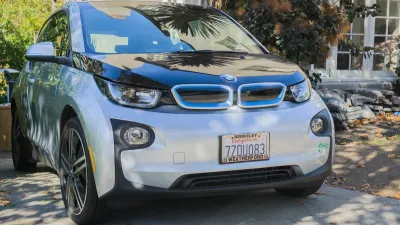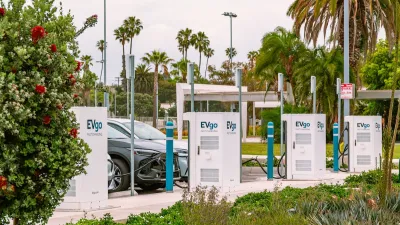City planners say the new rules would ensure an efficient distribution of charging infrastructure across the city and prevent an overconcentration in residential areas.

The Austin City Council is considering changes to the city’s regulations on electric vehicle charging stations, reports Jo Clifton in Austin Monitor. “According to the city’s Climate Equity Plan, by 2030, Austin should have ‘a compelling and equitably distributed mix of level 1, 2, and DC fast charging infrastructure to accommodate 40 percent of total vehicle miles traveled in the city. This translates to 226 megawatts of electrical load and could mean more than 37,000 charging ports.’”
City planners say they want to avoid concentrating EV charging stations in residential and “pedestrian-friendly” areas. “The proposed regulations would permit electric vehicle charging stations at existing gas stations and discontinued gas stations, so long as a subsequent use of the site did not include a restaurant or a residential use.” EV chargers could also be located on commercial sites, highway-adjacent properties, industrial sites, and other non-residential zones.
The proposed rules also include regulations limiting the size of charging stations and their proximity to other chargers, which industry experts are pushing back on.
The council will consider the proposed rules on May 16.
FULL STORY: New rules in the works for electric vehicle charging stations (Austin, TX)

Planetizen Federal Action Tracker
A weekly monitor of how Trump’s orders and actions are impacting planners and planning in America.

Maui's Vacation Rental Debate Turns Ugly
Verbal attacks, misinformation campaigns and fistfights plague a high-stakes debate to convert thousands of vacation rentals into long-term housing.

San Francisco Suspends Traffic Calming Amidst Record Deaths
Citing “a challenging fiscal landscape,” the city will cease the program on the heels of 42 traffic deaths, including 24 pedestrians.

Amtrak Rolls Out New Orleans to Alabama “Mardi Gras” Train
The new service will operate morning and evening departures between Mobile and New Orleans.

The Subversive Car-Free Guide to Trump's Great American Road Trip
Car-free ways to access Chicagoland’s best tourist attractions.

San Antonio and Austin are Fusing Into one Massive Megaregion
The region spanning the two central Texas cities is growing fast, posing challenges for local infrastructure and water supplies.
Urban Design for Planners 1: Software Tools
This six-course series explores essential urban design concepts using open source software and equips planners with the tools they need to participate fully in the urban design process.
Planning for Universal Design
Learn the tools for implementing Universal Design in planning regulations.
Heyer Gruel & Associates PA
JM Goldson LLC
Custer County Colorado
City of Camden Redevelopment Agency
City of Astoria
Transportation Research & Education Center (TREC) at Portland State University
Jefferson Parish Government
Camden Redevelopment Agency
City of Claremont





























